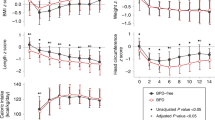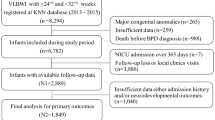Abstract
Objective
Examine the relationship between weight trajectory and 2-year neurodevelopmental outcomes for extremely low birthweight (ELBW) infants with BPD.
Study design
Secondary analysis of infants born from 2010 to 2019. The predictor was BPD severity and the outcome was neurodevelopmental impairment, defined as any Bayley Scales of Infant Development (BSID) III score <70 at 24 months’ corrected age. Repeated measures logistic regression was performed.
Results
In total, 5042 infants were included. Faster weight trajectory was significantly associated with a decreased probability of having at least one BSID III score <70 for infants with grade 1–2 BPD (p < 0.0001) and an increased probability of at least one BSID III score <70 for infants with grade 3 BPD (p < 0.009). There was no significant association between weight trajectory and BSID III score <70 for infants with grade 0 BPD.
Conclusion
The association between postnatal weight trajectory and neurodevelopmental outcome in this study differs by BPD severity.
This is a preview of subscription content, access via your institution
Access options
Subscribe to this journal
Receive 12 print issues and online access
$259.00 per year
only $21.58 per issue
Buy this article
- Purchase on Springer Link
- Instant access to full article PDF
Prices may be subject to local taxes which are calculated during checkout

Similar content being viewed by others
Data availability
Access to the Vermont Oxford Network Extremely Low Birth Weight Follow-Up database can be granted by emailing EME (eedwards@vtoxford.org).
References
Stoll BJ, Hansen NI, Bell EF, Walsh MC, Carlo WA, Shankaran S, et al. Trends in care practices, morbidity, and mortality of extremely preterm neonates, 1993-2012. JAMA. 2015;314:1039–51.
Katz TA, Vliegenthart RJS, Aarnoudse-Moens CSH, Leemhuis AG, Beuger S, Blok GJ, et al. Severity of bronchopulmonary dysplasia and neurodevelopmental outcome at 2 and 5 years corrected age. J Pediatr. 2022;243:40–6.e2.
DeMauro SB. Neurodevelopmental outcomes of infants with bronchopulmonary dysplasia. Pediatr Pulmonol. 2021;56:3509–17.
Malavolti AM, Bassler D, Arlettaz-Mieth R, Faldella G, Latal B, Natalucci G. Bronchopulmonary dysplasia-impact of severity and timing of diagnosis on neurodevelopment of preterm infants: a retrospective cohort study. BMJ Paediatr Open. 2018;2:e000165.
Gallini F, Coppola M, De Rose DU, Maggio L, Arena R, Romano V, et al. Neurodevelopmental outcomes in very preterm infants: the role of severity of bronchopulmonary dysplasia. Early Hum Dev. 2021;152:105275.
Ehrenkranz RA, Dusick AM, Vohr BR, Wright LL, Wrage LA, Poole WK. Growth in the neonatal intensive care unit influences neurodevelopmental and growth outcomes of extremely low birth weight infants. Pediatrics. 2006;117:1253–61.
Gaultier C. Malnutrition and lung growth. Pediatr Pulmonol. 1991;10:278–86.
Belfort MB, Rifas-Shiman SL, Sullivan T, Collins CT, McPhee AJ, Ryan P, et al. Infant growth before and after term: effects on neurodevelopment in preterm infants. Pediatrics. 2011;128:e899–906.
Franz AR, Pohlandt F, Bode H, Mihatsch WA, Sander S, Kron M, et al. Intrauterine, early neonatal, and postdischarge growth and neurodevelopmental outcome at 5.4 years in extremely preterm infants after intensive neonatal nutritional support. Pediatrics. 2009;123:e101–9.
Bando N, Fenton TR, Yang J, Ly L, Luu TM, Unger S, et al. Association of postnatal growth changes and neurodevelopmental outcomes in preterm neonates of <29 weeks’ gestation. J Pediatr. 2023;256:63–9.e2.
Jensen EA, Schmidt B. Epidemiology of bronchopulmonary dysplasia. Birth Defects Res A Clin Mol Teratol. 2014;100:145–57.
Jeng SF, Hsu CH, Tsao PN, Chou HC, Lee WT, Kao HA, et al. Bronchopulmonary dysplasia predicts adverse developmental and clinical outcomes in very-low-birthweight infants. Dev Med Child Neurol. 2008;50:51–7.
Brumbaugh JE, Colaizy TT, Patel NM, Klein JM. The changing relationship between bronchopulmonary dysplasia and cognition in very preterm infants. Acta Paediatr. 2018;107:1339–44.
Madden J, Kobaly K, Minich NM, Schluchter M, Wilson-Costello D, Hack M. Improved weight attainment of extremely low-gestational-age infants with bronchopulmonary dysplasia. J Perinatol. 2010;30:103–11.
Natarajan G, Johnson YR, Brozanski B, Farrow KN, Zaniletti I, Padula MA, et al. Postnatal weight gain in preterm infants with severe bronchopulmonary dysplasia. Am J Perinatol. 2014;31:223–30.
Bauer SE, Schneider L, Lynch SK, Malleske DT, Shepherd EG, Nelin LD. Factors associated with neurodevelopmental impairment in bronchopulmonary dysplasia. J Pediatr. 2020;218:22–7.e2.
Mataloun MM, Leone CR, Mascaretti RS, Dohlnikoff M, Rebello CM. Effect of postnatal malnutrition on hyperoxia-induced newborn lung development. Braz J Med Biol Res. 2009;42:606–13.
Poindexter BB, Martin CR. Impact of nutrition on bronchopulmonary dysplasia. Clin Perinatol. 2015;42:797–806.
Decollogne L, Epiard C, Chevallier M, Ego A, Alin L, Debillon T. Neurodevelopmental impairment at 2 years of age in children born before 29 weeks’ gestation with bronchopulmonary dysplasia. Arch Pediatr. 2021;28:23–8.
Collaco JM, McGrath-Morrow SA. Respiratory phenotypes for preterm infants, children, and adults: bronchopulmonary dysplasia and more. Ann Am Thorac Soc. 2018;15:530–8.
Wu KY, Jensen EA, White AM, Wang Y, Biko DM, Nilan K, et al. Characterization of disease phenotype in very preterm infants with severe bronchopulmonary dysplasia. Am J Respir Crit Care Med. 2020;201:1398–406.
Li Ching Ng L, Patel S, Plourde H, Besner ME, Lapointe A, Bizgu V, et al. The association between BMI trajectories and bronchopulmonary dysplasia among very preterm infants. Pediatr Res. 2023;93:1609–15.
Belfort MB, Gillman MW, Buka SL, Casey PH, McCormick MC. Preterm infant linear growth and adiposity gain: trade-offs for later weight status and intelligence quotient. J Pediatr. 2013;163:1564–9.e2.
Bell KA, Matthews LG, Cherkerzian S, Palmer C, Drouin K, Pepin HL, et al. Associations of growth and body composition with brain size in preterm infants. J Pediatr. 2019;214:20–6.e2.
Ramel SE, Gray HL, Christiansen E, Boys C, Georgieff MK, Demerath EW. Greater early gains in fat-free mass, but not fat mass, are associated with improved neurodevelopment at 1 year corrected age for prematurity in very low birth weight preterm infants. J Pediatr. 2016;173:108–15.
Nakanishi H, Uchiyama A, Kusuda S. Impact of pulmonary hypertension on neurodevelopmental outcome in preterm infants with bronchopulmonary dysplasia: a cohort study. J Perinatol. 2016;36:890–6.
Choi EK, Shin SH, Kim EK, Kim HS. Developmental outcomes of preterm infants with bronchopulmonary dysplasia-associated pulmonary hypertension at 18–24 months of corrected age. BMC Pediatr. 2019;19:26.
Martin M, Smith L, Hofheimer JA, McGowan EC, O’Shea TM, Pastyrnak S, et al. Bronchopulmonary dysplasia and neurobehavioural outcomes at birth and 2 years in infants born before 30 weeks. Arch Dis Child Fetal Neonatal Ed. 2023;108:142–8.
Funding
EME receives a grant from Vermont Oxford Network.
Author information
Authors and Affiliations
Contributions
FAM contributed to study conceptualization and design, data interpretation, and drafted the initial manuscript. EHC and JSL contributed to study conceptualization and design, data interpretation, and revision of the manuscript. EME was responsible for data acquisition, initial analysis, creation of tables and figures, and contributed to revision of the manuscript. MJ contributed to data interpretation and revision of the manuscript. All authors approve the final manuscript as submitted.
Corresponding author
Ethics declarations
Competing interests
The authors declare no competing interests.
Ethical approval
No IRB or other ethics board approval was required for this study. This study was completed in accordance with the Declaration of Helsinki.
Additional information
Publisher’s note Springer Nature remains neutral with regard to jurisdictional claims in published maps and institutional affiliations.
Rights and permissions
Springer Nature or its licensor (e.g. a society or other partner) holds exclusive rights to this article under a publishing agreement with the author(s) or other rightsholder(s); author self-archiving of the accepted manuscript version of this article is solely governed by the terms of such publishing agreement and applicable law.
About this article
Cite this article
Munoz, F.A., Carter, E.H., Edwards, E.M. et al. Does faster weight trajectory lead to improved neurodevelopmental outcomes in ELBW infants with bronchopulmonary dysplasia?. J Perinatol 44, 301–306 (2024). https://doi.org/10.1038/s41372-023-01808-z
Received:
Revised:
Accepted:
Published:
Issue Date:
DOI: https://doi.org/10.1038/s41372-023-01808-z



